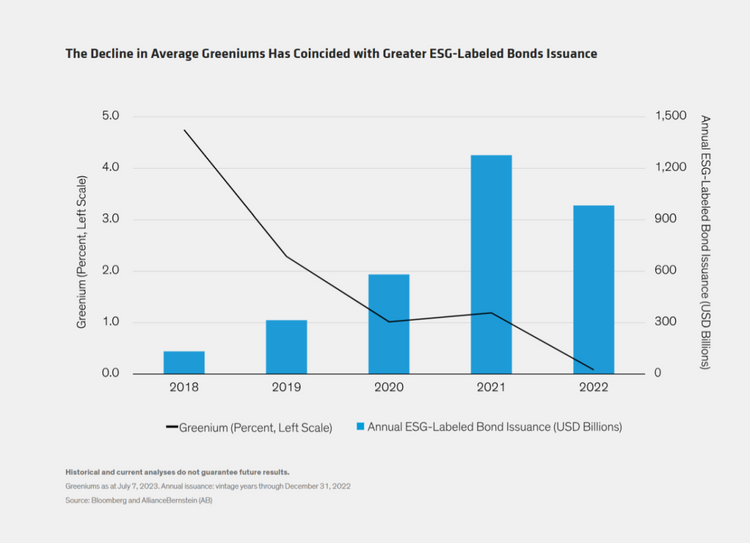AB: ESG-Labeled Bonds: Are Greeniums Doomed To Dwindle?

Investors who are interested in ESG-labeled bonds anticipate that bonds with robust green or social credentials and a well-thought-out structure will be priced higher compared to conventional bonds from the same issuer. This additional cost, commonly referred to as the "greenium," appears to have decreased over the years. However, when considering factors like the quality and amount of bonds issued in a specific year, a more detailed and intricate view emerges.

While it is widely known that the average premium for environmentally-friendly bonds in major bond indices has declined in the past few years, the importance of the year in which these bonds were issued (vintage) for such premiums is not well comprehended. However, the vintage year holds significance as the levels of issuance for bonds labeled with environmental, social, and governance (ESG) criteria, as well as the quality of their ESG value, have shown considerable variation throughout time.
The drop in average green premiums has been mainly caused by two interconnected factors: the higher amount of ESG-related bonds being issued and the simultaneous reduction in the quality of the ESG offerings in numerous recent cases. We can gain a clearer understanding of these changes by examining different time periods.
We have observed that numerous ESG-labeled bonds, which were issued during the period of 2018-2019, have sustained their greeniums consistently. These bonds originate from reputable financial organizations and prominent European entities that are recognized for their excellence.
In comparison, companies that have recently embraced ESG principles and started issuing bonds have generally issued bonds with less advantageous structures, resulting in minimal premium values.
Like always with bonds that have an ESG label, it is crucial to assess each one separately since these securities have different features, not only within each sub-category but also from one bond to another. The only method to decide if an ESG-labeled bond is worthy of its premium is through comprehensive fundamental analysis.
The opinions stated in this article are not considered as research, guidance for investment, or suggestions for trades, and they may not reflect the perspectives of every AB portfolio-management team. These opinions are subject to possible changes in the future.
Discover further insights into AB's stance on accountability and commitment by delving into our dedicated section on responsibility.
See the original material here.
AB is a leading global investment firm that provides excellent research and diversified investment services to big institutional investors, individuals, and wealthy clients in major markets worldwide. We strongly believe that corporate responsibility, responsible investing, and stewardship are closely linked. In order to properly manage our clients' assets, we make a conscious effort to invest responsibly by evaluating, engaging with, and incorporating important issues such as the environment, society, governance, and climate change into most of our actively managed strategies. We also believe that being a responsible company allows us to be better investors. Our approach to stewardship, investment strategy, and decision-making is guided by our purpose, mission, and values.
Our objective, which is to discover knowledge that opens doors, motivates our company to act in a responsible manner. While the concept of opportunity may vary for each person involved in our business, it always involves considering the distinct objectives of each person that go beyond the desire for financial profits. AB's main goal is to assist our clients in defining and accomplishing their investment objectives, explicitly outlining what we do every day to uncover opportunities for our clients. In 2011, we joined the Principles for Responsible Investment (PRI) as a way to solidify our commitment to finding responsible methods to unlock opportunities for our clients through the integration of environmental, social, and governance (ESG) factors in a majority of our actively managed investment accounts, funds, and strategies.
As an active manager, our unique perspectives enable us to generate superior returns and create inventive investment options. Environmental, social, and governance (ESG) concerns, as well as climate-related issues, play a pivotal role in shaping our perspectives. They also help us identify potential risks and opportunities that could affect the performance of the companies and entities we invest in, as well as the portfolios we curate.
Our core principles establish a structure for the conduct and deeds that fulfill our objectives and goals. These values harmonize our behaviors. Each value arises from the shared nature of our organization, but also represents our aspirations. Every value motivates us to evolve into a more accountable version of AB.
As of the end of 2022, AB had a total of $646 billion in assets that it manages, with $445 billion of those assets being ESG-integrated. If you want to learn more about AB, you can visit our website at www.alliancebernstein.com.







































